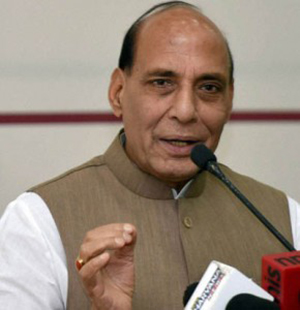New Delhi, Nov 28: Seeking to break the deadlock, Home Minister Rajnath Singh today told Lok Sabha that Prime Minister Narendra Modi will speak on demonetisation if the Opposition wanted, but the rival parties demanding debate with a provision for voting remained unimpressed, forcing the House to adjourn for the second time.
A number of opposition leaders, including Mallikarjun Kharge (Cong), Sudip Bandhopadhyay (TMC) and Mulayam Singh Yadav (SP), spoke as they pressed for acceptance of their demand for an adjournment motion, a condition not acceptable to the treasury benches which want a debate without voting.
With the Opposition parties firm on their stand, Singh said nobody is questioning the government's intentions over demonetisation or imputing any malafide.
He said that the government was willing to listen to the complaints and suggestions different parties have over the execution of the demonetisation move.
"As far as the Prime Minister coming to the House is concerned, if the Opposition wants he will come and intervene. I want to assure the Opposition. We are ready for a discussion," the Home Minister said during the Zero Hour, after the Opposition leaders had spoken.
The decision on under which rule the discussion would take place is for the Speaker to make, he said.
Demonetisation is a "historic, bold and pro-poor" decision, Singh said, adding that it was taken to target black money and was in national interest.
However, members of a dissatisfied Opposition rushed to the Well, forcing Speaker Sumitra Mahajan to adjourn the House till 1400 hours.
Earlier, Kharge said demonetisation had harmed the economic system, the farmers, youths, labourers and women among others who are in distress.
Maintaining that over 70 people have died due to the faulty implementation, he cited the incident of a Union Minister facing difficulty in paying hospital bills after his brother died and said it is an evidence of the crisis. Union Minister Sadananda Gowda's brother had died in Karnataka.
"There is only one way to break this deadlock. The Prime Minister should come here (to the House) and our adjournment motion be accepted," Kharge said.
Bandhopadhyay said the government must take initiative to break the impasse as people will ask what does Parliament stand for, if it is adjourned everyday.
Supporting Kharge, the SP chief said if Modi does not come to the House on such an important matter, then when he will come. Farmers are facing a lot of problems, he said.
Jai Prakash Narayan Yadav (RJD) called the decision impractical and anti-people. An AIADMK member said the government should take initiative to ease people's sufferings, while B Mahtab (BJD) said the onus was on the Centre to take steps to break the impasse.
Anandrao Adsul (Shiv Sena) said neither 'Bharat Bandh' nor 'Aakrosh Diwas', which different opposition parties have announced for today, was visible but lamented that the recent announcement of NABARD disbursing Rs 21,000 crore to cooperative banks has not been implemented. Situation remains bad in rural areas, he said.





Comments
Add new comment